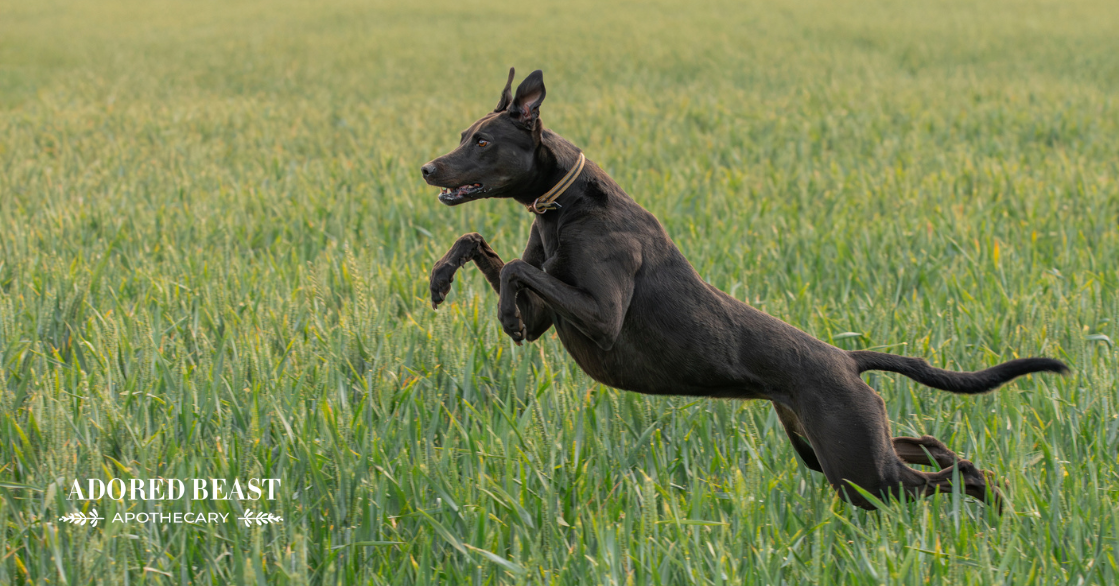A diagnosis of Cushing’s disease in horses can be stressful for any owner. Approximately 30% of horses over 15 years of age develop Cushing’s. That’s a lot of horses. With this statistic in mind, we have to ask the question: why is this happening so commonly in domestic horses?
Today’s article is dedicated to shedding some light on this metabolic disease and thinking outside the box when it comes to its development and management.
What is Cushing’s Disease in Horses?
Cushing’s, also known as Pituitary Intermedia Dysfunction (PPID) is an auto-immune (inflammatory) disease of the pituitary gland, located at the base of the brain. When this gland becomes inflamed and enlarged, it over-stimulates the production of adrenocorticotropic hormone (ACHT). ACHT stimulates the production of the stress hormone cortisol.
As cortisol rises in the bloodstream, it affects insulin regulation and the ability to regulate blood sugar levels. A complication of Cushing’s and the dysregulation of insulin is an increased risk of laminitis, a painful condition of the tissue (laminae) bonding the hoof wall to the pedal bone in the leg.
What Cushing’s is not:
Insulin resistance (IR) AKA equine metabolic syndrome (EMS) is another metabolic disorder which can be mistaken as Cushing’s disease. The two are separate issues that have different treatment profiles so it’s important to distinguish whether your horse is insulin resistant or if Cushing’s is responsible for the dysregulation of insulin. Usually, blood tests will reveal high blood glucose and then further ACTH testing needs to be done to confirm or rule out Cushing’s as the primary issue.
What Causes Cushing’s?
In medical terms, the cause of Cushing’s is the inflammatory enlargement of the pituitary gland, leading to an over-production of ACTH. But, to understand more about how to approach this disease holistically, we have to go a bit further back than that and explore why this inflammation develops in the first place.
Let’s take a look at what science is telling us right now.
- Epigenetics is a new field of science that explores how auto-immune disorders are more multifaceted than simply a genetic predisposition. New science in the field of epigenetics is showing that auto-immune diseases have definite emotional and environmental components which have the ability to turn on genes that code for various auto-immune diseases. This is important to understand in the scheme of all we can do to prevent and manage equine disease including Cushing’s (1) (2).
- Stress is arguably a huge factor in the development of all metabolic diseases since a chronic rise in cortisol can affect any facet of the endocrine system, including brain pituitary function (3) (4). Stress can come in many forms including living conditions (environment), lack of exercise/movement, training schedule, social interactions, horse shows, disordered sleep, and more.
- Poor diet – High starch diets in particular have an effect on ACTH levels in horses, increasing it significantly (5).
- Circadian rhythm (seasonal) changes – ACTH can rise in horses during certain times of the year, particularly during the end of summer and into the fall (5).
- Steroid Drugs – Synthetic corticosteroids (dexamethasone) and prednisone can increase the risk of both Cushing’s and laminitis.
- Glyphosate – Also known as Roundup, glyphosate is an herbicide found in many common equine feed stuffs, including wheat, corn, soy, sugar beets, and more. It is a patented antibiotic and known endocrine deregulator. (6)
- Gut-disturbing factors – The microbiome has a marked influence on the entire metabolic system. Every day, new strains are being link to different aspects of metabolic signalling within the mammalian body. When it’s chronically disturbed or unhealthy, it can cause metabolic changes, including changes in brain and pituitary and adrenal function. (7)
How Can we Protect our Horses?
As horses age, their risk of developing of Cushing’s increases so it’s important to start early with prevention if you can. Even if your horse is still young, you can set them up for a long, healthy life with a lower risk of Cushing’s development by following some simple rules. I call it the SAD method:
SAD stands for STRESS, ACTIVITY, and DIET. These are helpful tips for mitigating the progression of Cushing’s disease in horses. Here’s my SAD assessment system for understanding your horse’s “ground zero” and where they might need help. This is a great way to formulate a holistic approach with your veterinarian if your horse receives this diagnosis.
1. (S)tress
Has your horse experienced prolonged physical stress eg. illness or inflammatory issues?
Inflammation plays a part in the development of all chronic diseases.You’ll need to assess your horse’s overall inflammatory load eg. sporting, barn and disease management.
Does your horse have a history of chronic GI issues (eg. ulcers and/or colic)?
Gut imbalance also puts your horse at risk for endocrine disease. Be proactive and ensure you are not using farm management methods that might be contributing to gut disease in your horses. (Eg. confined quarters, lack of movement, sporadic feeding schedule, processed/high starch feeds, poor hay quality, etc.) – check out my article on Equine Gut Health for more information on how to assess your farm management plan in relation to gut health.
Is your horse on drugs that might be affecting his insulin sensitivity?
If your horse is on corticosteroid medications, make an effort to work with a holistic vet and/or a holistic equine nutritionist to come up with solutions to reduce or eliminate these drugs from your horse’s treatment program.
Does your horse seem emotionally stressed?
Mental/emotional stress may play a significant role in the development of Cushion’s causing glucocorticoid hormone secretion which affects the pituitary gland. Horses can display obvious signs of emotional stress but some are stoic about it so make sure you are really honest with yourself about how comfortable they are in their own skin and in their environment. Increased cortisol levels due to chronic stress can also contribute to obesity, increasing the risk of insulin resistance and laminitis.
Is your horse sleeping properly?
Lack of sleep is a major stress factor. This can be related to exercise program, pain, social issues in the barn, and even the type and amount of bedding you use. It’s a vicious cycle because lack of sleep can cause inflammation, metabolic and neurological stress.
2. (A)ctivity
Does your horse get enough exercise?
Exercise is a major contributor to immune system health and inflammatory regulation. Be sure your horse is getting enough! Just like humans, your horse needs an appropriate exercise program to maintain a healthy weight and reap all the benefits of moving in a healthy way. Obesity also contributes to inflammatory diseases of joint and cardiovascular tissues which may cause stress and affect insulin sensitivity. The amount of turnout your horse gets can also affect their predisposition to obesity. Check out my article Turn Out Your Horses for more info.
3. (D)iet
Does your horse have a high starch diet?
Excessive dietary starch contributes to pituitary stress and insulin resistance. Turf the processed feed. Seriously, do it now… Processed feeds, even legume-based ones like soy, will raise your horse’s blood sugar levels because they become starchy when they are excessively heat-treated. Processed starch is not an appropriate energy source for any long-term equine diet plan.
Are you feeding your horse foods that contain the herbicide Roundup?
Roundup (glyphosate), is a chemical herbicide that is science proves is carcinogenic and hormone disruptive. It is also classified as an antibiotic, causing digestive changes to the microbiome. Additionally, it is registered as a chelating agent, dramatically reducing the bioavailability of trace minerals including manganese, copper, iron, and zinc. These minerals are all indicated for supplementation in the metabolically diseased horse. Make sure you’re not feeding processed feed that includes wheat, corn, soy, and canola as they have the highest levels of glyphosate.
Is your horse getting the right kind of dietary fibre?
Resistant starch (the kind that doesn’t break down into sugar) is what your horse’s forage should be high in. High fibre diets contribute to helping moderate insulin production through the effects of gastric motility, transit time, gastrointestinal hormone secretion, and colonic fermentation which creates anti-inflammatory short chain fatty acids (in particular, butyrate). Fibre also feeds the healthy microbes that make up the digestive microbiome. All of these factors help to prevent and improve symptoms of Cushing’s disease.
Is your horse getting adequate minerals and vitamins?
Micro mineral deficiencies are common in metabolic horses, particularly zinc, copper, iron, selenium, and chromium. Vitamin C and E reduce oxidative stress and inflammation. Most hay is deficient in vitamin E so it is important to use supplementation if that’s all they are eating.
Complications from Conventional Treatment of Cushing’s Disease in Horses
Pergolide is a common medication used to regulate ACTH levels in horses. Unfortunately, it can cause pituitary damage (hypoadrenocorticism) with long term use so it’s important to consider this when going forward with your treatment options. (8)
Cushing’s disease in horses can be stressful, but thankfully we can help decrease the risk and better manage it, naturally, if it rears its ugly head.
References
- Journal of Autoimmunity: The genetics and epigenetics of autoimmune diseases, 2009
- Discovery Medicine: Environmental triggers and epigenetic deregulation in autoimmune disease, 2011
- National Institutes of Health: Stress hormone causes epigenetic changes, 2010
- Journal of Molecular Endocrinology: Epigenetic programming of the neuroendocrine stress response by adult life stress, 2017
- Domestic Animal Endocrinology: Effect of dietary carbohydrates and time of year on ACHT and cortisol concentrations in adult and aged horses, 2018
- Chemosphere: Glyphosate and the key characteristics of an endocrine disruptor: A review, 2020
- American Physiological Society: The microbiota-gut-brain axis, 2019
- BEVA Equine Veterinary Education: Latrogenic secondary hypoadrenocorticism in a horse with pituitary pars intermedia dysfunction (equine Cushing’s disease), 2007












